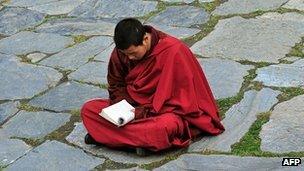Tibet monk dies in China after self-immolating
- Published

Rights groups have long criticised China's treatment of Tibetan monks
A 40-year-old Tibetan monk has died after setting himself on fire early on Sunday in Qinghai province in north-west China, officials say.
Chinese state media said Nyage Sonamdrugyu was a Tibetan Buddhist spiritual leader.
His body was returned to his relatives, media reports said.
Activists say at least 15 people have set themselves alight in the past year, demanding an end to tight Chinese controls in ethnically Tibetan areas.
Correspondents say that it is the first time that Qinghai - a Tibetan-inhabited province - has been hit by such a protest. Most self-immolations have taken place in the neighbouring province of Sichuan.
The Tibetan government-in-exile, based in India, said in a statement that the victim self-immolated to protest against a lack of religious freedom.
"Due to his position as a local spiritual leader, approximately 2,000 local Tibetans are said to have held a candlelight vigil urging the local police authorities to release his body," it said.
The statement said that police agreed to do this in order "to avert further tension".
The latest death comes after two former monks in Sichuan set themselves on fire on Friday - one died on Sunday and another is being treated in hospital.
The Dalai Lama has condemned the self-immolations, but says people are being driven to desperation by "cultural genocide" under Chinese rule.
Beijing rejects this and accuses the Tibetan spiritual leader of encouraging people to set themselves on fire.
The Chinese authorities say their policies have brought a better standard of living to many Tibetans.
China is reluctant to allow journalists access to sensitive Tibetan areas and information about what is happening on the ground is difficult to verify.
- Published8 January 2012
- Published9 December 2011
- Published16 November 2011
- Published7 November 2011
- Published2 December 2011
- Published14 November 2011